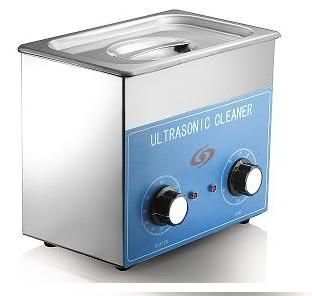Can someone please educate me about the mysteries of "Pickling". I know you do it to copper or brass either before or after silver soldering, but thats all I know. When I silver solder I use a white flux paste on the peices being silver soldered, and it works fine. So---Why would I pickle the peices? Would I pickle them before I silver solder to prep the metal, or do I pickle the metal afterwards to remove discoloration and melted flux? If the answer is "before", do I still have to use my flux? Please, educate me about pickling.---Brian
You are using an out of date browser. It may not display this or other websites correctly.
You should upgrade or use an alternative browser.
You should upgrade or use an alternative browser.
Pickling---Why, and When
- Thread starter Brian Rupnow
- Start date

Help Support Home Model Engine Machinist Forum:
This site may earn a commission from merchant affiliate
links, including eBay, Amazon, and others.
fcheslop
Well-Known Member
Hi Brian,I usually pickle after silver soldering to remove the oxide and simply clean well before soldering.

as you can see its looking pretty black after soldering

and looking a lot better after being pickled and rubbed over with wire wool for the pickle I use an American product Scale Clean its citric acid and available in 1/2 pound packs try sweat hearting an espresso engineer we use it to descale the boilers.
best wishes Frazer

as you can see its looking pretty black after soldering

and looking a lot better after being pickled and rubbed over with wire wool for the pickle I use an American product Scale Clean its citric acid and available in 1/2 pound packs try sweat hearting an espresso engineer we use it to descale the boilers.
best wishes Frazer
Tin Falcon
Well-Known Member
- Joined
- Jul 9, 2007
- Messages
- 7,207
- Reaction score
- 789
it is my understanding picking is a chemical cleaning process. It saves labor time and is more thorough than mechanical methods, it gets into all details. Oxides can impede the soldering process so pickling before soldering improves the joint. fluxes only go so far . It does do its job to keep the joint clean during heating witch cases oxidation to bare metal. . The downside of fluxes is that they tend to be acidic leaving them on the metal after solder can cause corrosion and deterioration of the joint. Removing flux is imperative. And like has been said removing the oxidation improves appearance and restores the metal to original color.
Tin
Tin
moanaman
BarryG41
- Joined
- Apr 9, 2011
- Messages
- 68
- Reaction score
- 3
Hi Brian
Here is a recipe from an Australian Model Magazine. Citric acid in powder form is available at the Super Market (not mine near me but was available at a beer brewing shop). Used by people who home brew beer and wine I understand.
In a plastic container put 40 grams of citric acid powder and add 1litre hot water (from the hot water service is fine) and stir until all powder is all dissolved. Ratio of powder to water is not critical according to the article. When I mixed mine it was a double dose as I wanted more solution. Place the job in and in 10 minutes the job should have be clean of flux etc. I used it first immediately after I mixed it so the acid was still warm. It did a a good job. A few days later I use same solution, cold for the second time and it took a little longer to do the job about 25 minutes. As an experiment I did it a 3rd time and left the test piece in there for 2 days. The test piece was clean and didn't seem to effect the brass as all.
It was suggested to wash the work piece off with a warm water after pickling but I used cold and that seemed OK .
Barry G
Here is a recipe from an Australian Model Magazine. Citric acid in powder form is available at the Super Market (not mine near me but was available at a beer brewing shop). Used by people who home brew beer and wine I understand.
In a plastic container put 40 grams of citric acid powder and add 1litre hot water (from the hot water service is fine) and stir until all powder is all dissolved. Ratio of powder to water is not critical according to the article. When I mixed mine it was a double dose as I wanted more solution. Place the job in and in 10 minutes the job should have be clean of flux etc. I used it first immediately after I mixed it so the acid was still warm. It did a a good job. A few days later I use same solution, cold for the second time and it took a little longer to do the job about 25 minutes. As an experiment I did it a 3rd time and left the test piece in there for 2 days. The test piece was clean and didn't seem to effect the brass as all.
It was suggested to wash the work piece off with a warm water after pickling but I used cold and that seemed OK .
Barry G
Brian
Pickling removes all the oxides and gunk in readiness for soldering. I may be wrong here but I keep everything I've made in the pickle as I make it. That way its ready to go at assembly time. It goes back in after every soldering operation ready for the next one.
I wouldn't be so sure about doing that with a sulphuric acid pickle but take the view that if I can consume citric acid a bit of copper isn't going to come to much harm. (though don't try drinking your pickle)
Pete
so---if all you chaps are correct, I should pickle before AND AFTER I have soldered????????
Pickling removes all the oxides and gunk in readiness for soldering. I may be wrong here but I keep everything I've made in the pickle as I make it. That way its ready to go at assembly time. It goes back in after every soldering operation ready for the next one.
I wouldn't be so sure about doing that with a sulphuric acid pickle but take the view that if I can consume citric acid a bit of copper isn't going to come to much harm. (though don't try drinking your pickle)
Pete
so---if all you chaps are correct, I should pickle before AND AFTER I have soldered????????
It certainly does not hurt to pickle first, a lot depends on what you are working on. For a couple of bits of brass straight of the machine there is no need. If its a flanged boiler plate that has been bashed about, maybe annealed a few times, had layout lines and marking fluid/pen on it then its an easy way to get it all clean. Remember you should not be using emery type abrasives to clean the work prior to soldering and scotchbrite/wirebrush can be hard work or difficult in some areas.
I would not leave work in the acid for extended times
J
I would not leave work in the acid for extended times
J

$190.00
$254.99
Genmitsu CNC 3018-PRO Router Kit GRBL Control 3 Axis Plastic Acrylic PCB PVC Wood Carving Milling Engraving Machine, XYZ Working Area 300x180x45mm
SainSmart Official

$188.98
TM NEXDYNAMI RE41157 Water Pump Compatible With/Replacement For/John Deere 6200 7400 6300 6600 6500 6400 7220 7600 7200 RE41157
VIVID MARKET CORPORATION

$94.99
$109.99
AHS Woodmaster 4400 Maintenance Kit for Outdoor Wood Boiler Treatment
Alternative Heating & Supplies

$99.99
$109.99
AmTech300 - Boiler Treatment Professional Strength (Rust Inhibitor For Outdoor Wood Boilers)
Alternative Heating & Supplies

$59.99
Sunnytech Hot Air Stirling Engine Motor Model Educational Toy Electricity Generator Colorful LED (SC001)
stirlingtechonline

$99.99
AHS Outdoor Wood Boiler Yearly Maintenance Kit with Water Treatment - ProTech 300 & Test Kit
Alternative Heating & Supplies

$519.19
$699.00
FoxAlien Masuter Pro CNC Router Machine, Upgraded 3-Axis Engraving All-Metal Milling Machine for Wood Acrylic MDF Nylon Carving Cutting
FoxAlien Official

$45.99
Sunnytech Mini Hot Air Stirling Engine Motor Model Educational Toy Kits Electricity HA001
stirlingtechonline

$156.90 ($1.40 / oz)
Replacement Combustion Chamber Kit, Burnham V8 and V8H, 1-6 Sec, 108136-01, 1129
Lynn Manufacturing

$39.99
$49.99
Sunnytech Low Temperature Stirling Engine Motor Steam Heat Education Model Toy Kit For mechanical skills (LT001)
stirlingtechonline

$403.09
DM14 Engine Build Kit, Metal Engine Build Model Great Metal Material for Engineer for Factory
Easoger Official
Tin Falcon
Well-Known Member
- Joined
- Jul 9, 2007
- Messages
- 7,207
- Reaction score
- 789
I would say clean before and after. if the copper is new a quick scotch brite of the joint area may be quicker.
Tin
Tin
Like many things in "Machining world", pickling is one of the things I am aware of, but being aware of something is far different than KNOWING about it. There have been some terrific threads recently about molding silicone sparkplug boots, building boilers, etcetera. I thought that all members of this forum, myself included could stand to know more about this process.---Brian
Citric is nice and safe, but other acids can work as well. If in doubt, dilute heavily and test. Big factories use a lot of sulphuric acid for pickling, very diluted, of course. Plain vinegar with added salt will take scale and oxidation off after heat treatment or soldering. Even muriatic (hydrochloric) acid works well, just be sure to dilute and do it outside with gloves and goggles, and TEST.
sunworksco
Rocket Man
- Joined
- Nov 20, 2010
- Messages
- 242
- Reaction score
- 13
I use a heated ultrasonic cleaner with citric acid.
It is ultra fast and cleans well.
Kind regards,
Giovanni

It is ultra fast and cleans well.
Kind regards,
Giovanni

The reason citric acid is used for pickling in small workshops is because it is SAFE. Stick a bit of sugar in it and it could almost be classed as lemonade (before use of course). You can even use your bare hands to pick things out of it (but wash them afterwards because of the metals and crap contained within the solution).
The easy way to get your saturated mix is to use say half or a pint of warm water and gently add crystals whilst stirring continuously, until no further crystals will dissolve, you will soon see it, there will just be a few rotating in the bottom of the container. There is no benefit in putting extra in to try to increase the potency, the water can only support a certain amount in solution, and once that point is reached, that's it.
There is no need to discard it after use, just keep using it until it doesn't work any more. You usually get things like algae growing in it over time, but unless it is swimming about and has teeth, nothing to worry about. A spoonful of domestic bleach is supposed to stop the algae growing.
I used to do a fair amount of silver soldering, and a 1 pint batch in a Tupperware sealed container would easily last me six months. Once it is exhausted, just pour it down the drain.
It isn't as powerful as the usual Sulphuric acid mix or commercial pickling salts, but it is a lot safer, and besides, what is half an hour extra wait when you are having so much fun.
BTW, I have forgotten about bits and left them in there for weeks, and they never came to any harm, it seems that it cleans, forms it's own pure oxide coating and then stops eating away at anything. The bits will still solder up perfectly well.
John
The easy way to get your saturated mix is to use say half or a pint of warm water and gently add crystals whilst stirring continuously, until no further crystals will dissolve, you will soon see it, there will just be a few rotating in the bottom of the container. There is no benefit in putting extra in to try to increase the potency, the water can only support a certain amount in solution, and once that point is reached, that's it.
There is no need to discard it after use, just keep using it until it doesn't work any more. You usually get things like algae growing in it over time, but unless it is swimming about and has teeth, nothing to worry about. A spoonful of domestic bleach is supposed to stop the algae growing.
I used to do a fair amount of silver soldering, and a 1 pint batch in a Tupperware sealed container would easily last me six months. Once it is exhausted, just pour it down the drain.
It isn't as powerful as the usual Sulphuric acid mix or commercial pickling salts, but it is a lot safer, and besides, what is half an hour extra wait when you are having so much fun.
BTW, I have forgotten about bits and left them in there for weeks, and they never came to any harm, it seems that it cleans, forms it's own pure oxide coating and then stops eating away at anything. The bits will still solder up perfectly well.
John
- Joined
- Mar 1, 2010
- Messages
- 866
- Reaction score
- 82
My citric acid pickle very quickly turns pale blue. For example I made a new batch yesterday and today its pale blue after my boiler has been in soak overnight. After a while a florescent blue crystal sediment forms on the bottom of the tank. What is this? I had thought it could be copper sulphate but I've just wikied citric acid and its C6H8O7 so where would the sulphate bit come from?
Any clues from you chemists what it is? and is it really OK to throw down the sink? With my last batch I let the water evaporate and a I bagged up the dried up crust.
Pete
Any clues from you chemists what it is? and is it really OK to throw down the sink? With my last batch I let the water evaporate and a I bagged up the dried up crust.
Pete
hi,
since there is no sulphate in the solution it is copper citrate, hardly soluble in water, and blue like other copper salts. Yes, you are dissolving some metal with the acid pickle bath.
Zephyrin
since there is no sulphate in the solution it is copper citrate, hardly soluble in water, and blue like other copper salts. Yes, you are dissolving some metal with the acid pickle bath.
Zephyrin
steamboatmodel
Well-Known Member
- Joined
- Sep 7, 2008
- Messages
- 303
- Reaction score
- 7
Hi Chuck,
I have used white Vinegar a few times for pickling, It takes longer than Citric Acid, but is cheaper and the wife had already been using it for windows and mirrors.
Regards,
Gerald.
I have used white Vinegar a few times for pickling, It takes longer than Citric Acid, but is cheaper and the wife had already been using it for windows and mirrors.
Regards,
Gerald.
Thank you gentlemen for all of your answers. I hope to hear from more of you who may have something to add, and will bookmark this thread for future reference.---Brian
- Joined
- Aug 8, 2009
- Messages
- 929
- Reaction score
- 12
Jasonb said:Remember you should not be using emery type abrasives to clean the work prior to soldering ......
J
How come?
-T
I don't really know the scientific reason but have always been told not to, I think it can look clean but leaves an oxide layer.
Have a look at the bottom of this page, plenty of good info on silversoldering/brazing on their site
http://www.cupalloys.co.uk/brazing-of-copper-c99.html
J
Have a look at the bottom of this page, plenty of good info on silversoldering/brazing on their site
http://www.cupalloys.co.uk/brazing-of-copper-c99.html
J
The red emery cloth has iron oxide, a ferrous metal. Ferrous metals can cause nonferrous metals to have accelerated corrosion. This is due to leaving traces of the ferrous metal in the pours of the nonferrous metal. Some examples are polishing aluminum, copper, brass and other nonferrous metals with a steel wire brush, steel wool or emery cloth. It will shine up right away but over the long run will become dull. Brass, cleaned with a brass brush will keep its shine longer, same with copper using a copper brush and aluminum using an aluminum brush.
Kenny
Edit: This is what the Federal Aviation Administration says about corrosion control. The answer is on page 6-25 Abrasive Papers.
http://www.faa.gov/library/manuals/aircraft/amt_handbook/media/FAA-8083-30_Ch06.pdf
Kenny
Edit: This is what the Federal Aviation Administration says about corrosion control. The answer is on page 6-25 Abrasive Papers.
http://www.faa.gov/library/manuals/aircraft/amt_handbook/media/FAA-8083-30_Ch06.pdf
Similar threads
- Replies
- 15
- Views
- 2K





















































